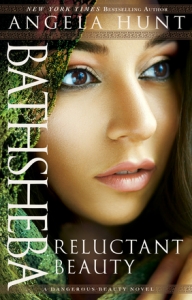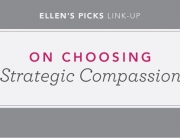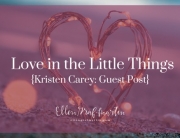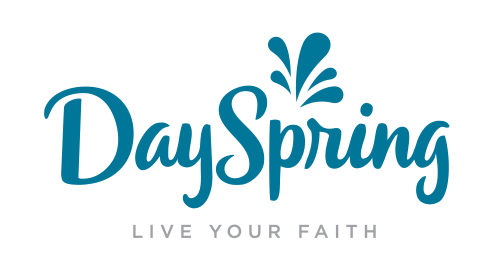
Years ago, I did a study on the life of David. Friends, I was an indignant mess. For whatever reason, studying David made me flat-out angry.
Because, in my struggling towards holiness 20-something heart and mind, honestly? If David, “a man after God’s own heart”, was such a complete mess with continual missteps, there was no hope for a normal flaw-ridden girl like me. None. I was destined to never quite make it. I remember the looks of discomfort and horror on the other women’s faces when I railed against David and shared my disappointment in God’s chosen King. (Looking back, these dear women were so kind and patient with me and my outspoken feedback on how David could have stepped it up a notch and actually lived up to his press.)
 I’d mostly forgotten about those angst-filled, dark 12 weeks of the soul until I picked up Bathsheba last fall. I love Biblical fiction, and Angela Hunt’s books are so well researched and rich with historical detail that I’m lost in their pages. I am not sure if I’ve mellowed with age and experience, but somehow, as I read Bathsheba, I was grateful for this treatment of the man I’d thought was God’s “golden child”, and the woman he loved. He was real. He was emotional. He was driven and a failure and a success and proud and humble and, essentially, human. And he was used by God. I saw mercy and grace and awful pain.
I’d mostly forgotten about those angst-filled, dark 12 weeks of the soul until I picked up Bathsheba last fall. I love Biblical fiction, and Angela Hunt’s books are so well researched and rich with historical detail that I’m lost in their pages. I am not sure if I’ve mellowed with age and experience, but somehow, as I read Bathsheba, I was grateful for this treatment of the man I’d thought was God’s “golden child”, and the woman he loved. He was real. He was emotional. He was driven and a failure and a success and proud and humble and, essentially, human. And he was used by God. I saw mercy and grace and awful pain.
Bathsheba, she who has been demonized for being a temptress and that ever-so-seductive bath? (Come on, THIS is what we remember the mother of Solomon for?) She became real. She became a friend. My heart broke at her story of loss, victimization and loneliness. I was disappointed in David, and encouraged by his repentance, although it never did atone for the hurt he’d caused. I grew fond of David and Bathsheba, as they grew older and lived the difficult life of ruling an unruly people. I loved Solomon, and was driven back to scripture to see if his brothers had really been that bad. (They were. For the love, these boys were miserable.)
And while this was a work of fiction, it made me stop and realize in a new way that my view is clouded by assumption. I’ve got ideas of what people should be like, look like, act like. Of what the perfect redemption story looks like. I can pin hopes on the possibility of being good enough. I’ve got a pretty good idea of what a woman after God’s own heart should look like.
Here’s the thing: it looks a lot less like a well-curated perfect life, and a lot more like the woman I see in the mirror. A woman who has made some terribly bad choices. Who has caused hurt and pain. Who is gifted. Who struggles with doubt. Who is called by God, loved, chosen and redeemed. Who stumbles again and again. Who has been blessed beyond imagination. Who wishes she could cover up some of the uglier parts of her story. Who is amazed at the glorious parts of her story. Who, in many ways is just like David and Bathsheba.
Instead of being angry at David, the story has been redeemed for me in many ways. God chooses people just like me, and has since the beginning of time. People who are in process and in need of a Saviour. Biblical fiction is just that – fiction. But it has brought to life those who can be one-dimensional as I read through the pages of my Bible. I’m grateful for this fresh perspective and compassion for those I’d previously disregarded or cast aside in confusion, and glad for this encouragement: I can see myself on those pages, and I’m loved and known, even the parts of my story I’d rather keep hidden.
 Loading InLinkz ...
Loading InLinkz ...















Ellen, thank you so much for this book. As I mentioned in my Facebook post, I was so excited to tuck into a fiction novel over the holidays. And enjoyed it so much I did it two more times thereafter. So my comments about the book are actually about the content and the style.
I’ll start with the style. I had forgotten how much I love reading fiction. I tend to steer away because there is so much serious, growing stuff I need to read to be a better me…right? I had forgotten how much I get from fiction…how much rest, restoration and escape from all the serious stuff. I came out of my Christmas holiday more relaxed than I have felt in a long time. And besides the extra sleep I was blessed with, I do know that part of that was the rest I received from immersing myself in a (3) good fiction novel(s). So thank you for that reminder. Rest is good for the soul, the body, the mind. Jesus did it, so how off the mark is it for me to not do it?!
Now the content of the book itself. I confess that I had never thought about some aspects of that story the way I found myself thinking about them as I read. You know what never crossed my mind before? That David raped Bathsheba. Why I ever thought she would have gone to him willingly is beyond me. Perhaps I didn’t want to think that kind of violence possible of “a man after God’s own heart”. The other thing I never considered, was how unappealing it would have been for Bathsheba to become a Queen. I admit, I’ve always been “one of those” happily ever after suckers. I love a good romance. I have always been “a girlie girl”. So I think I did just what you said, Ellen. I superimposed my assumptions about Royal Life in a Palace onto this story. I allowed the allure of escape into a fantasy land to blur out reality. Until I read this book.
Truth is, life is not perfect. And there are no real life fairy tales. But there is Jesus. There is redemption. There is the all-powerful, almighty love of our God to save us, and hold us and make us into who He wants us to be. Which really is better than a fairy tale, because it means when the reality of life rears its ugly head, there is no threat of the bubble bursting. Nothing can burst the bubble He creates for us in Him. I’m so thankful for that. I need there to be a place. A place a can escape to even after I’ve finished the last page of a good book. A place where there is no end. Which is what I find in Him. It’s what the story is about. It’s what David and Bathsheba both found, and what they tell us about through their lives individually and together.
Lovely post.
Nice reflection Ellen – makes me think I should dig in…I’m afraid I just haven’t been focused on a few other things these days to get to it!
Thanks so much Ellen for this month’s pick – Bathsheba. It was so perfect for my downtime. I actually got sick and read it in one day while in bed. I loved how it made the story of Bathsheba come alive – not as a distant figure in the Bible, but a woman like me who experienced both the best & worst of life – love, hope, trauma, abuse, fear and redemption. What a revelation of what it must have been like to have a front row seat for David’s reign and the drama of his sons’ betrayal. I loved how she learned to trust in God’s goodness and faithfulness, even in the midst of a complete lack of control as a woman living under a King’s rule. I think that’s a lesson we all have to learn – sometimes again & again – when the illusion that we are in control of our lives is ripped away by circumstance and we realize once again that only in Him do we live and breathe and have our being. I remember learning that lesson very well when I climbed Kilimanjaro a few years ago, the highest mountain in Africa. I got very sick early on with altitude sickness and I described that climb as having the worst flu of your life while trying to do the most athletic thing you’ve ever done while you can’t breathe. haha! I had to trust God for every single step up that mountain and I did not know if I would make it. It was a terrible feeling. We say that we depend on God for everything, but when we actually have to do that, it is terrifying and humbling. And I think it’s exactly where God wants us! It was a huge lesson in my humanity, my desire for independence and my fear of being out of control. Faith is hard – yet rewarding, and I came away from that experience knowing that God got me both up AND down that mountain, and I can’t take credit for one second of it. What a beautiful testimony of His faithfulness. Thanks again for such an inspiring read. I’m pretty sure I”ll never read the story of David and Bathsheba the same way again.
I really enjoy good Christian fiction. However I am always a little hesitant around fiction based on a biblical character because so much needs to be left up to our imagination. Which makes for an interesting tension to hold between biblical accurately and taking the religious and cultural traditions of the time into account, all while writing a great work of fiction.
Having said all of that I really enjoyed Bathsheba. It was well written, thought provoking, biblically accurate (to the best of my understanding) and certainly made me consider David, Bathsheba and others from a different perspective. Angela Hunt gives us a glimpse into the lives of these biblical people; along with the reality of their sin, the consequences of sin, God’s over-riding plan, and His forgiveness and redemption of sin. I thought it was a great book and I’ll certainly read it again.
I have been struggling with my response to Angela Hunt’s Bathsheba. As a new member to this group, I borrowed the book from a fellow member, and devoured it within two nights. There is nothing neat and tidy about Bathsheba’s story – which is why I’m struggling with my own reaction to Hunt’s perspective about her life.
Reading Bathsheba was timely for me. Before learning about this book, my mother and I got into a discussion about Bathsheba over the Christmas break. Sadly, I let a single event define her. I pigeonholed her to be “that” woman – reckless with her husband’s heart (Uriah), yearning to be desired, and seeking the attention of a powerful king. Prior to reading this book, when I thought about the person of Bathsheba, I only saw her transgressions.
Angela Hunt offered me a new perspective on Bathsheba. All other accounts I have read (and believed) have portrayed Bathsheba as willingly committing adultery. No matter how they came together, clearly there is more to Bathsheba than what happened between her and David. She raised the wisest man in the world – clearly she had to be intentional as a mother!
Admittedly, I hated the notion that King David, “the man after God’s own heart”, would rape someone. For me it made the story even dirtier and I’ve struggled with what is fact versus fiction in Bathsheba. However, the more I reflect on this book, the more I realize that this is not the story of Bathsheba (or David for that matter), but rather the story of God’s redemptive love.
This book served as a powerful reminder for me to not judge a person by a single event. God can use the most humiliating, tragic and painful circumstances in our lives to lay down the foundation for something new.